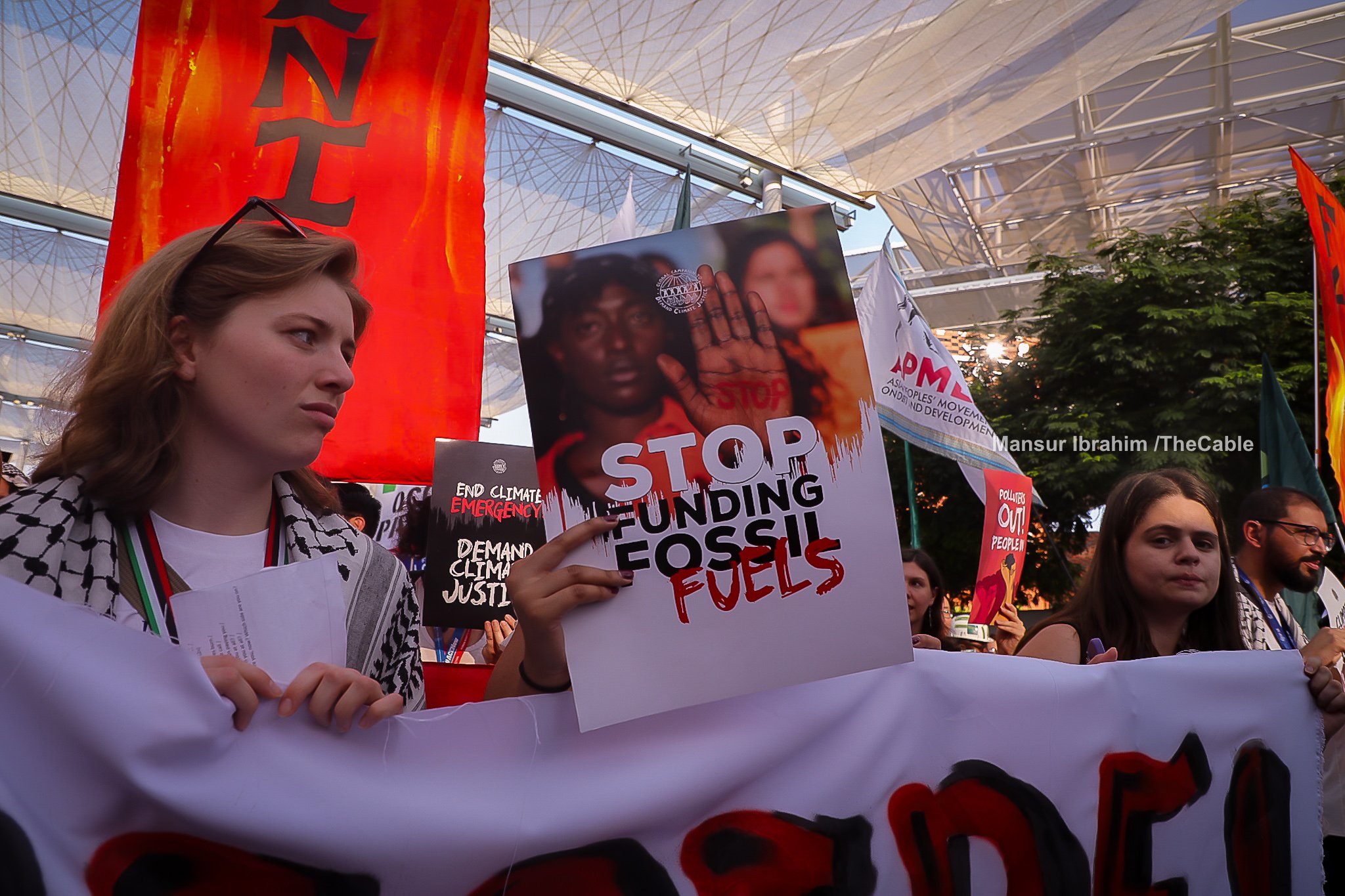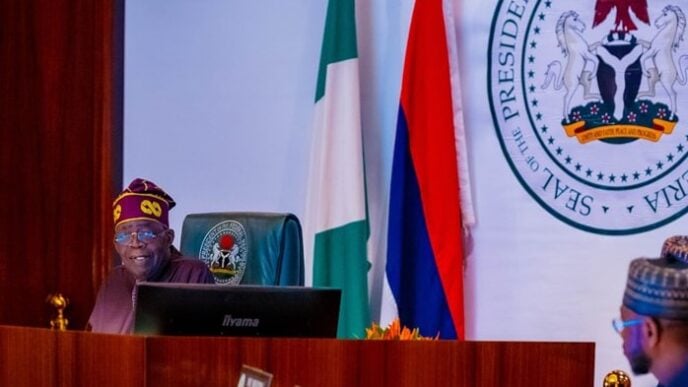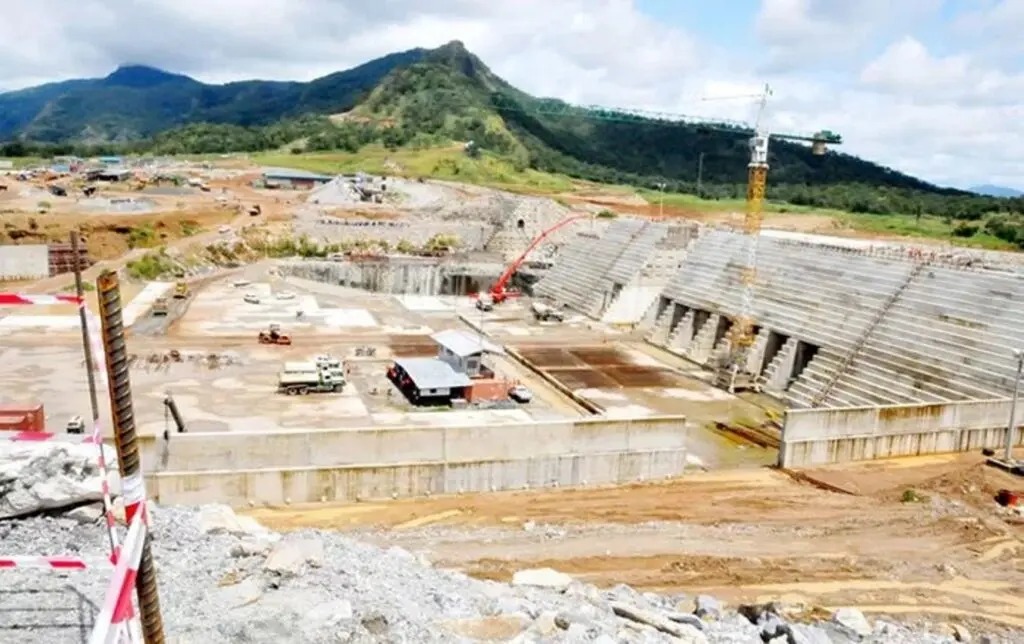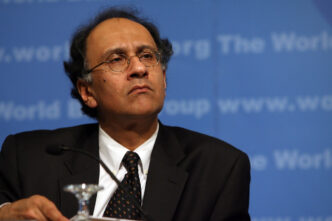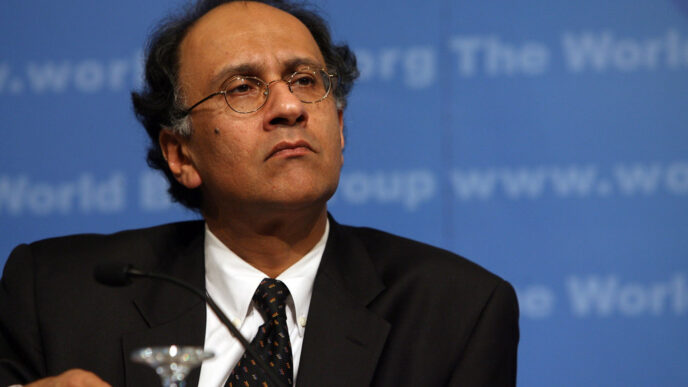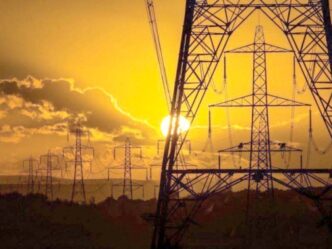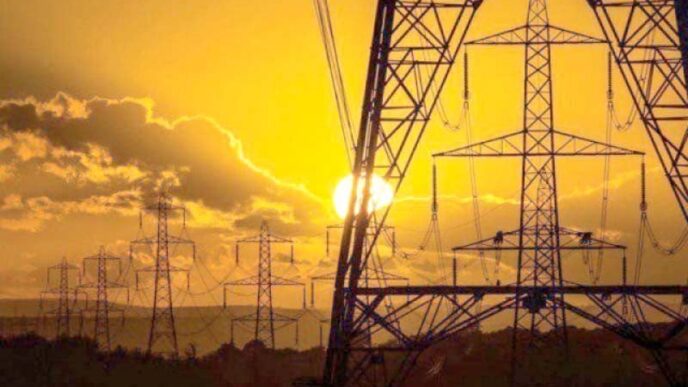Climate activists carry placards at COP28 chanting end to fossil fuel
Nigeria, Africa, and indeed the world face a critical juncture. Energy systems are evolving remarkably, shifting from fossil fuel dominance to renewable sources, and this transition fundamentally reshapes economies and the environment. In this transformation, we are tasked with an essential question: How do we harness the energy-economy-environment nexus to foster good governance and achieve sustainable development?
To explore this, we must first acknowledge the complexity of the nexus. The energy sector fuels economies, creates jobs, and drives industrialisation but also contributes to environmental degradation if not properly managed. On the other hand, environmental preservation is essential to long-term economic stability but requires carefully planned energy policies. This balancing act necessitates robust governance frameworks that ensure transparency, accountability, and effective resource management. Energy is the backbone of economic development. In Africa, energy access is critical to unlocking the potential for industrialisation, innovation, and improved livelihoods. However, many across the continent, including Nigeria, remain energy-poor. According to the 2022 Energy Access Report from the World Bank, Nigeria has one of the most significant energy deficits in the world. Also, as of 2021, 85 million individuals – more than 4 out of 10 Nigerians, do not have access to power from the national grid.
The empirical literature is unanimous on the importance of energy to human development. Chien et al. (2023), and Luan et al. (2023) argue that energy is a fundamental element for sustaining human survival and development. Thus, excessive energy poverty may hinder sustainable human development. Energy poverty stifles economic growth, education, healthcare, and gender equity. Similarly, studies like Pachauri et al. (2004), Sesan et al. (2013), and Belaïd (2022) identified energy poverty as one of the critical developmental challenges faced by developing and emerging economies.
The nexus of energy generation and consumption, economic growth and environmental degradation revolves around three significant hypotheses: the growth hypothesis, conservation hypothesis and feedback hypothesis. The growth hypothesis studies claimed that economic growth depends on energy consumption (Adams et al., 2018; Zafar et al., 2019). The conservation hypothesis was the opposite: economic growth fuels energy consumption (see Destek & Aslan, 2017). However, a feedback hypothesis is upheld where a two-way causality exists among these three variables (i.e., energy, economy and environment) (Aydin, 2019; Tugcu et al., 2012).
In Africa, some research has been conducted to ascertain the extent, causality and implications of energy consumption. One such example is the work of Acheampong (2018), who found that a positive shock to GDP increases energy consumption and carbon emissions in the short run but also increases stability in the long run. This finding corroborates with Paramati et al. (2018), who noted that industrialisation enhances energy saving for most African countries. On the contrary, Awodumi and Adewuyi (2020) discovered that CO2 emissions across African economies remained highly unstable, with Algeria being the leading carbon emitter due to the dominance of non-renewable energy consumption.
Advertisement
Therefore, energy consumption apparently promotes economic growth but contributes to higher carbon emissions. This raises some pertinent questions: To what extent do production and consumption of energy resources contribute to economic growth and carbon emissions in African economies? Should policy focus more on growth than reducing carbon emissions arising from energy resource consumption? These are policy-relevant questions.
Regarding the nexus between energy and good governance, pioneering studies have shown that the empirical side of the nexus aligns with economic theories. Fredriksson et al. (2004) analysed 12 OECD countries. They concluded that corruption reduces the effects of energy policy: increasing corruption leads to increased energy intensity and, implicitly, a decrease in energy efficiency. Stern (2012) discovered that the decline in corruption directly leads to increased energy efficiency. Further, Nicolli and Vona (2015) concluded that increased corruption indirectly affects renewable energy policy through its impact on the regulation of the energy products market.
The African continent is energy-poor, the poorest in the world. About 600 million Africans lack access to electricity, while over 900 million rely on traditional biomass fuels, such as wood and charcoal, for cooking and heating. These fuels lead to deforestation and indoor air pollution, contributing to an estimated 600,000 premature deaths annually (WHO, 2022). Limited access to electricity hampers economic development, educational opportunities, and healthcare services, further perpetuating poverty and inequality.
Advertisement
Moreover, an estimated three billion people worldwide still lack access to clean energy technologies for cooking (IEA, 2022). In the IEA’s most recent Global Energy Outlook report, global energy demand will increase by around 33% by 2050. This implies that energy, and sustainable energy for that matter, will remain central to our daily lives, the lifeblood that enables us all to function and prosper.
There is no doubt that the world needs more energy, but this need must be met ever more efficiently and sustainably, considering the challenges posed by climate change to our future. However, Africa needs even more energy. Its population is set to increase from 1.4 billion people today to around 2.5 billion by 2050. Its economic output is expected to triple, and energy demand will increase by 82%. It would increase even more, by 150%, if its GDP per capita doubled to 5,000 dollars in 2050 (World Bank, 2021).
At the same time, Africa suffers significantly from the effects of climate change despite being the least responsible for it. Africa’s cumulative Greenhouse gas (GHG) emissions are very low, and even today, Africa accounts for only 3 to 4% of the world’s total GHG emissions despite being home to 17% of the world’s population.
Given the evident developmental challenges confronting the African continent, it is clear that the narrative that Africa should abandon the development of its natural resource base for environmental protection is misguided. A wealthier Africa would be better positioned to contribute to climate change mitigation and adaptation efforts while addressing its energy security and socioeconomic development needs.
By leveraging the continent’s abundant natural resources, African nations can bolster their economies, lift millions out of poverty, and create the necessary infrastructure to facilitate the adoption of renewable energy technologies in the future. However, harnessing the potential of natural resources in Africa is not without challenges. One of the primary obstacles is the lack of infrastructure capacity to transport and distribute natural gas, for example. Constructing pipelines, liquefaction plants, and other infrastructure requires significant investments and long-term planning. My company, Green Energy International Limited, is already leading the way here in Nigeria by constructing the first indigenous terminal in Rivers State.
As Africa’s largest economy, Nigeria’s wide range of livelihoods, agricultural practices, and commodities are threatened by climate change. Rising sea levels increase vulnerability to flooding and waterborne disease. Additionally, drought and increasing flooding hinder agricultural production and fishing, reducing food security and negatively impacting health and nutrition in our dear nation. Drought, reduced rainfall and rising air temperatures inhibit the country’s hydropower systems. The energy sector, deforestation, and land-use change are the most significant contributors to Nigeria’s greenhouse gas (GHG) emissions (USAID report, 2023).
Advertisement
About 70% of Nigeria’s primary energy supply is derived from biomass. Poor on-grid power supply, which rarely exceeds 5 gigawatts, forces Africa’s largest economy to rely on more than 14 gigawatts of inefficient petrol and diesel backup generators across the country, contributing to around 30% of the fine particulate matter emissions from the continent (USAID report, 2023). According to the United Nations, Nigeria has the highest rate of deforestation worldwide, losing about 3.7% of its forest yearly.
All hands must be on deck to address the existential challenges of climate change. As responsible citizens of the globe, we must recognise that there is no ‘Plan B’ in addressing climate change.
Today, it is more important than ever to drive forward the global energy transition in the interest of climate change mitigation, energy security, and economic diversification and development.
We are already witnessing the global energy landscape changing dramatically, as seen in the succeeding United Nations-organized Conference of Parties. Countries and regions have developed energy transition plans. However, it is important to stress that energy transition in developing countries, including Africa, must involve transitioning out of poverty, transitioning towards growth, transitioning towards development, and transitioning sustainably.
Advertisement
Global investment in renewable energy reached a record high in 2022—at USD 0.5 trillion—, but this represented less than 40% of the average investment needed each year between 2021 and 2030, according to World Bank statistics, to meet the sustainable development goals and limit global warming to 1.5°C. More striking than the absolute numbers is that sub-Saharan Africa received less than 1.5% of the global investment in renewable energy.
The disparity in renewable energy financing received by developed versus developing countries has increased significantly over the past six years. For this reason, we must be creative and develop new approaches to ensure that no one is left behind regarding sustainable and affordable energy for all by 2030 and beyond.
Advertisement
African governments must prepare energy transition plans considering the reality of green growth. These plans are critical policy and investment tools to deliver affordable, reliable, and clean energy while expanding energy services for all. Many African countries have demonstrated a willingness to be leaders and equal partners in the energy transition, with countries like Kenya, Nigeria, Ghana, and others developing world-class whole-economy transition plans (ETPs).
These ETPs are very important, and I may use the example of the Nigeria ETP, which Former President Buhari launched at COP26. The ETP in Nigeria is backed by law. The ETP covers all sectors of the economy, including the power sector, transport, housing, agriculture and forestry, and clean cooking. The ETP gives a price tag of USD 1.9 Trillion for Nigeria to reach net zero by 2060, of which USD 410 billion will be above business-as-usual spending. These figures are definitely beyond Nigeria’s ability alone. The Advanced Economies must come to her aid.
Advertisement
While energy drives economic growth, we must not ignore its profound environmental impact. Carbon emissions from energy production and industrial activities have escalated the climate crisis, leading to more frequent natural disasters, rising sea levels, and extreme weather conditions that disproportionately affect the poorest populations. We have a collective responsibility to act. Africa, while contributing the least to global carbon emissions, remains one of the most vulnerable regions to climate change impacts. This paradox compels us to think critically about our development pathways.
Meanwhile, renewable energy offers a beacon of hope. The International Renewable Energy Agency (IRENA) estimates that 90 per cent of the world’s electricity will come from renewable energy by 2050. This is an opportunity we must seize. In Africa, it is likewise projected that 76% of the continent’s energy could come from renewable sources by 2040. If harnessed efficiently, Africa is endowed with abundant solar, wind, and hydropower resources that can power our industries, rural areas, and fast-growing cities. The energy transition presents a path to prosperity for millions of Nigerians and Africans, but only if we prioritise infrastructure, innovation, and research investments to ensure the transition is inclusive and equitable. Africa needs help to achieve the energy finance and advanced technology needed to achieve this.
Advertisement
Sustainable development demands that we embrace renewable energy solutions that reduce our carbon footprint. Adopting solar energy, wind farms, and energy-efficient technologies is no longer a choice but a necessity. Moreover, Africa’s vast forests, wetlands, and ecosystems must be protected as carbon sinks, vital for mitigating climate change. However, achieving this will require more than just good intentions. We must build the institutional capacity to monitor and enforce environmental regulations, ensuring that our natural resources are preserved for future generations. Robust governance frameworks that integrate environmental sustainability into economic planning will be essential.
Good governance lies at the heart of this nexus. The glue holds the energy, economy, and environment together in harmony. Without sound governance, policy fragmentation occurs, leading to inefficiencies, corruption, and, ultimately, failure to achieve sustainable development. Governance in the energy sector requires a multi-stakeholder approach. Governments must lead with clear, long-term strategies but cannot act alone. Private sector investments, international cooperation, and the involvement of local communities are crucial. Public-private partnerships (PPPs) should be encouraged to accelerate energy infrastructure projects, and innovative financing mechanisms should be explored to support renewable energy adoption.
Furthermore, transparency and accountability are non-negotiable. Citizens must be informed and involved in decision-making, particularly regarding resource allocation, environmental management, and policy implementation. Open dialogue and inclusive governance foster trust and drive the effective execution of policies that benefit the economy, the environment, and society.
The energy transition is a global challenge; no single nation can solve it alone. International cooperation is essential, particularly for African nations. Technology transfer, capacity building, and financing are areas where partnerships with the international community can support Africa’s energy transition and climate resilience efforts.
We must also recognise that Africa’s energy and environmental issues are not isolated. Africa must be a key player as global energy systems move toward renewable dominance. This means engaging with international bodies, leveraging global best practices, and ensuring that Africa’s voice is heard in global forums, from the United Nations Climate Change Conference (COP) to the International Energy Agency (IEA).
The nexus between energy, the economy, and the environment is the cornerstone of sustainable development. We need bold leadership, sound governance, and an unwavering commitment to sustainability to harness this nexus. Let us focus on actionable strategies to address Africa’s energy challenges, promote economic growth, and protect our environment.
What we do today will determine the legacy we leave for future generations.
Sustainable consumption is not necessarily about consuming less. It is about consuming better—in an intelligent and environmentally sustainable way.
Adegbulugbe, FNAEE, FNES is the Chairman/CEO, Green Energy International Limited.
Views expressed by contributors are strictly personal and not of TheCable.
Add a comment

